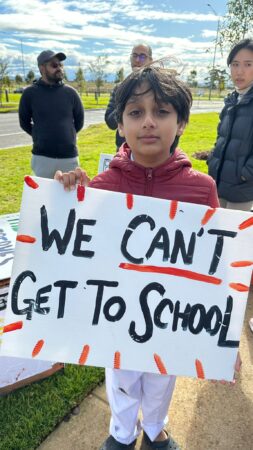By Adele Vosper, Sustainable Cities Collective member.
The results of the Werribee by-election clearly show that business cannot continue as usual. While residents are tired of being largely ignored and taken for granted by Labor, they are also not convinced that the Liberals will offer them anything better.
Residents’ frustration and anger at the state of public transport in the West was on clear display at the packed-out Werribee Transport Forum run by the Sustainable Cities Collective on Wednesday 5th February. The decision of both the Labor and the Liberal candidates not to attend the forum fuelled residents’ fury with cries of “shame” filling the room when they found out.
[If you missed the forum, you can watch the livestream on YouTube]

Despite being in a cost-of-living crisis, residents spoke of being forced to buy a car, or even second car, just so they can get to work, attend university, and take their children to childcare and school. It’s not just the cost of purchasing a car that puts a financial strain on residents, but the ongoing costs of registration, maintenance and fuel.
Lack of bus services to train stations means people have no choice but to drive to work as the train car parks fill up early in the morning. They are also forced to drive if they want to attend major and nighttime events as there are no buses to take them home afterwards.
The Better Buses Campaign is, however, about much more than just moving people efficiently from A to B. By increasing the speed, frequency, and connectedness of buses in the west, travelling by public transport will become the easier and most convenient option. This will have significant positive benefits on child and adolescent health and wellbeing.
The western suburbs, including those in the Werribee electorate, have some of the highest proportions of children aged under 15 years in Greater Melbourne. This is because lower property prices have made these suburbs attractive to families wanting to buy their own house.
Obesity and being overweight affects 25 percent of children and adolescents in Australia. It is associated with poorer health and wellbeing, worse performance at school, and increased health-care costs. Reductions in physical activity along with increases in sedentary behaviours are significant contributors to the increase in weight and obesity in children.
Walking or biking to/from the bus stop provides an easy opportunity to increase physical activity as part of a child or adolescent’s daily routine. Professor Susan Sawyer (Director of the Centre for Adolescent Health at the Royal Children’s Hospital) notes that easy access to public transport also supports children and adolescents to practice the skills they need to become independent and resilient.
Children are also particularly vulnerable to the negative effects of air pollution, which may make them more susceptible to asthma, cancer and respiratory infections. New research from Murdoch Children’s Research Institute (MCRI) and University of Melbourne, has also found that being exposed to higher levels of air pollution from infancy is associated with increased odds of developing a peanut allergy and having the allergy persist across the first 10 years of life.
An improved bus network will help shift people out of their cars and reduce pollution. According to Associate Professor Rachel Peters from MCRI, “Improving city design to support greater air quality regulation, better promoting public transport and switching to non-combustion fuels may help turn the tide on peanut allergy.”
Perhaps then, a challenge for all political parties and independents is to consider the impact that their transport and planning promises and decisions will have on children and adolescents, as well as future generations. As Professor Sawyer says, “More independent travel, whether by bike or public transport, is a no-brainer strategy that contributes to the current and future health of young people – and the planet.”
For more information on the Better Buses Campaign contact: Elyse Cunningham
Sustainable Cities Community Campaigner
elyse.cunningham@foe.org.au
https://www.melbournefoe.org.au/better_buses_campaign

